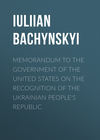Kitobni o'qish: «Memorandum to the Government of the United States on the Recognition of the Ukrainian People's Republic»
Memorandum to the Government of the United States on the Recognition of the Ukrainian People's Republic

UKRAINIAN MISSION
Washington, D.C.
May 12, 1920.
The Honorable, The Secretary of State,
Department of State, Washington.
Sir:
In view of the present status in eastern Europe, and in deference to the unsettled affairs of the territory of the former Russian empire, which are now pressing for a definite solution, I, as the representative of the Government of the Ukrainian People's Republic, conceive it to be my duty to submit for your consideration this memorandum setting forth the just claims of the Ukrainian people to political and economic independence. As a consequence of the facts herein explained, I respectfully ask the Government of the United States of America to extend recognition to the Ukrainian People's Republic as a free state.
The national aspirations of Ukraine embrace political liberation for all Ukrainians, consolidation of all free Ukrainians into one state, the erection of a constitutional democratic republic, and economic co-operation with neighboring and other states.
Ukraine's claim to independence is based upon the following principal grounds:
(1) The existence of the Ukrainians as a well-defined, separate, group-conscious race, with a continuous historic and cultural tradition;
(2) Their occupation, over a period of centuries, of the lands where they now dwell;
(3) Their age-long efforts, increasingly of popular origin, to achieve and maintain political independence;
(4) The obvious interest and desire of the entire Ukrainian population to organize and sustain its economic life free of exploitation by neighbors and foreign powers; and
(5) The crying need for a new order in eastern Europe, and the permanent elimination of the historic struggle between Poland and Russia to control the natural resources of Ukraine.
By all the canons of ethnology and history, the Ukrainians form a distinct racial unit. In America there has been a popular impression that Ukraine is merely a province of Russia, identified with it linguistically and racially. This is a misapprehension. The leading anthropologists, even among the Russians, agree that the Ukrainians constitute a physical type clearly different from the Great Russians, the White Ruthenians or the Poles. In culture and temperament they display peculiarities which permeate their whole social and moral nature. Their language is a separate Slavic tongue, and not merely a dialect of the Great Russian.
"Between Ukrainians and Russians," says Sir Donald Mackenzie Wallace, a learned student of Russia, "there are profound differences of language, customs, traditions, domestic arrangements, mode of life and communal organizations. Indeed, if I did not fear to ruffle unnecessarily the patriotic susceptibilities of my Great Russian friends who have a pet theory, I should say that we have here two distinct nationalities…"
"The historic development," says the official statement of the Russian Imperial Academy of Sciences, "contributed toward the creation of two nationalities: the Great Russian and the Ukrainian. The historic life of the two peoples failed to develop a common language for them. On the contrary, it really strengthened those dialectic variances with which the ancestors of the Ukrainians, on the one hand, and those of the Great Russians, on the other, made their appearance in history. And, of course, the living Great Russian idiom, as it is spoken by the people of Moscow, Riazan, Archangel, Yaroslavl or Novgorod cannot be called a 'Pan-Russian' language as opposed to the Ukrainian of Poltava, Kiev or Lviv (Lemberg)."
The Ukrainian race is as nearly autochthonous as any in central or eastern Europe. A brief survey of history shows that, for more than one thousand years, the Ukrainians and their forbears have continued to occupy approximately the same lands which they now inhabit, except for temporary recessions and re-colonizations caused by Mongol invasions. In the ninth century they were already settled in the vast and fertile plains and woodlands lying between the Carpathian Mountains and the Sea of Azov, and embracing the valleys of the Dniester, Pruth, Boh, Dnieper and Donetz.
Organized government in Ukraine began with the ancient state of Kiev. The ascendancy of Kiev also marks the period of Ukraine's greatest political expansion. From the ninth to the thirteenth century, Kiev was the center of the economic, intellectual and political life of eastern Europe, uniting the entire ethnographic Ukrainian territories. The name by which this state was known was "Russ," taken from the name of the reigning dynasty. This term was later appropriated by the Great Russians. "Because of the Byzantine commerce, learning and craft," observes the Polish historian Zakrzewski, "Kiev, the 'mother of Russ cities,' was for the Poland of the eleventh and twelfth centuries what Rome had been for earlier Germans." The French geographer Reclus notices that academies flourished at Kiev and Ostrog before the Great Russians owned a single high school, and draws attention to the fact that Russia, during the regenerative period of Peter the Great, received her teachers from Ukraine.
The fall of Kiev and Ukraine's subsequent loss of autonomous statehood in the fourteenth century can only be ascribed to the old system of military conquest. The affairs of eastern Ukraine became confused and decadent through the constant Mongol pressure which began in the thirteenth century. One hundred years later, part of western Ukraine also, weakened by frequent Tatar invasions, fell a prey to Poland, to whom she was a tempting prize because of her rich soil.










